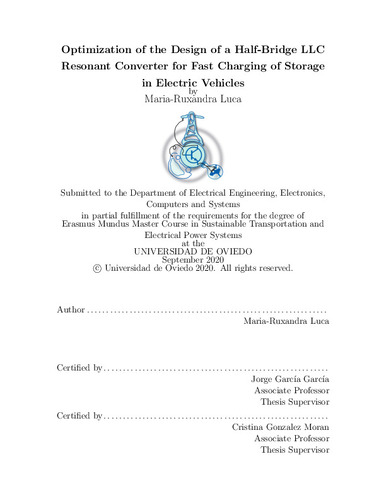Optimization of the Design of a Half-Bridge LLC Resonant Converter for Fast Charging of Storage in Electric Vehicles
Autor(es) y otros:
Director(es):
Palabra(s) clave:
Optimization of the Design of a Half-Bridge LLC Resonant Converter for Fast Charging of Storage in Electric Vehicles
Fecha de publicación:
Serie:
Máster Universitario Erasmus Mundus en Transporte Sostenible y Sistemas Eléctricos de Potencia
Descripción física:
Resumen:
This thesis proposes a method for the optimization of a LLC resonant converter in order to achieve maximum e ciency for a desired load. The novelty of this converter is the usage of GaN switching devices instead of Si MOSFETs. The prototype is converting 600 V from the input to a nominal output voltage of 75.6 V, with a maximum output power of 5.2 kW. First, an initial design is made without using any optimization process to calculate its e ciency. The losses taken into consideration are the core and copper losses generated by the inductors, the switching and conduction losses coming from the GaN switches, plus the losses generated by the recti er diodes. Afterwards, an optimization algorithm is implemented, which consists of an iterative solver, to determine the optimal design of the inductors which were causing the majority of the losses in the initial design. Maximum e ciency value of 98.6% has been achieved for the optimized converter.
This thesis proposes a method for the optimization of a LLC resonant converter in order to achieve maximum e ciency for a desired load. The novelty of this converter is the usage of GaN switching devices instead of Si MOSFETs. The prototype is converting 600 V from the input to a nominal output voltage of 75.6 V, with a maximum output power of 5.2 kW. First, an initial design is made without using any optimization process to calculate its e ciency. The losses taken into consideration are the core and copper losses generated by the inductors, the switching and conduction losses coming from the GaN switches, plus the losses generated by the recti er diodes. Afterwards, an optimization algorithm is implemented, which consists of an iterative solver, to determine the optimal design of the inductors which were causing the majority of the losses in the initial design. Maximum e ciency value of 98.6% has been achieved for the optimized converter.
Colecciones
- Trabajos Fin de Máster [5292]
Ficheros en el ítem





